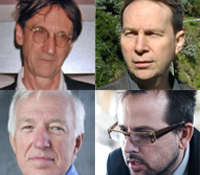AUTONOMOUS Perspectives: A Forum on Art, Engineering and Critical Theory |
||
|
||
|
DESCRIPTION/ABSTRACT: - Ryan Bishop: Farther Afield: The Cultural Politics of Remote Sensing in the Long Cold War; - Benjamin Bratton: Autonomy as Abstraction: Notes on Robotics and Material Composition; - Peter Ballantine: Transferences Between the Process of Fabrication and the Specificity of Material Form; and - Robert Skelton: Deployable Tensegrity Structures. Bishop and Bratton are speaking about general themes related to the exhibition topic, while Ballantine and Skelton will refer to their works in the exhibition (and in the case of Ballantine, the work he fabricated for sculptor Donald Judd). All speakers will expand on other issues raised by works on display in the AUTONOMOUS exhibition which runs through January 30, 2014 (with a two-week break for the holiday starting Dec. 21 and reopening January 6). RSVP requested to Trish Stone: tstone@ucsd.edu Media Contact Doug Ramsey dramsey@ucsd.edu http://gallery.calit2.net SPEAKER BIO: PRESENTERS Peter Ballantine works as a private curator, restorer, research and lecturer. He is a leading expert on sculptor Donald Judd, having worked extensively with Judd from 1969 until the death of the artist in 1994. He was directly responsible for the fabrication of over 200 Judd works and for coordinating with a large number of other fabricators on behalf of the artist. Ballantine has also been closely involved in the authentication, restoration, curatorship and display of Judd works; since 2004, he has curated Judd exhibitions in London, Cologne, Madrid and New York. Ballantine has contributed to the conservation and restoration of over 2,000 Judd works in all media, and served as Art Supervisor of both the Donald Judd Estate (1994-2000) and the Judd Foundation (2000-2004). Ballantine is writing a book-length study of the work, practices and ideas of Donald Judd, called The Philosophy of Real Objects. Ballantine recently completed coordinating a series of three symposia in Oregon, New York and Berlin over the past four years. In 2012 he also curated a Sprueth Magers exhibition on Working Papers: Donald Judd Drawings 1963-93. Ryan Bishop is Professor of Global Art and Politics at the Winchester School of Art, University of Southampton. He co-edits the journal Cultural Politics (Duke UP) with John Armitage and Doug Kellner, edits the Global Public Life sections of Theory Culture & Society with John Phillips, edits the Theory Now series for Polity and co-edits with Armitage and Joanne Roberts the new series Technicities for Edinburgh UP. His new books include Virilio and Visual Culture (EUP 2013), co-edited with John Armitage, Comedy and Cultural Critique in American Film (EUP 2013), Otherwise Occupied (Al-hoash, Third Text 2013) and Modernist Avant-Garde Aesthetics and Contemporary Military Technology: Technicities of Perception (EUP 2011), co-authored with John Phillips. Benjamin H. Bratton is a theorist whose work spans Philosophy, Art and Design. He is Associate Professor of Visual Arts and faculty coordinator of the MFA program; and Director of D:GP, The Center for Design and Geopolitics at the University of California, San Diego. Starting in Summer 2014, he is also Professor at The European Graduate School in Saas-Fee, Switzerland. His research is situated at the intersections of contemporary social and political theory, computational media & infrastructure, architectural & urban design problems, and the politics of synthetic ecologies and biologies. Current work focuses on the political geography of cloud computing, highly-granular universal addressing systems, and alternate models of ecological governance. His next book, The Stack: On Software and Sovereignty, is forthcoming. Jordan Crandall is a media artist, writer, and performer. He is Professor and Chair in the Visual Arts Department at University of California, San Diego. He is the 2011 winner of the Vilém Flusser Theory Award for outstanding theory and research-based digital arts practice, given by the Transmediale and the Vilém Flusser Archive of the University of Arts in Berlin. His current project, UNMANNED, is a blend of performance art, political theater, philosophical speculation, and intimate reverie, developed at the Eyebeam center for art and technology in New York City and most recently performed at V2_ Institute, Rotterdam. It explores new ontologies of distributed systems, and the status of the human in a militarized landscape increasingly dependent on automated technology. Crandall is Director of the Gallery@Calit2 Committee and founding director of the Active Structures + Materials research studio, an interdisciplinary test-site for new theories of materiality and new forms and methods of material practice. Robert Skelton is Professor Emeritus in the Mechanical and Aerospace Engineering department of the UCSD Jacobs School of Engineering, where he was the Daniel L. Alspach Professor of Dynamics Systems and Controls. He joined UCSD in 1996, from the School of Aero/Astro Engineering at Purdue University where served from 1975-1996, and from Lockheed Missiles and Space Company and then Sperry Rand during the years 1963-1975, where he worked on spacecraft control (SKLAB and Hubble Space Telescope). He is a member of The National Academy of Engineering and a Fellow of both AIAA and IEEE, He served on the Aeronautics and Engineering Board of the National Research Council. Skelton published 5 books and approximately 200 journal papers. He integrates the design of structures and their control systems, and his latest book shows how to use the tensegrity paradigm to accomplish this. He and his colleagues have developed models of red blood cells as tensegrity structures. He proved that tensegrity is the minimal mass solution to the five fundamental structure design problems. He often gives lectures to art institutes on How Art and Biology Are Revolutionizing Systems Engineering. MORE INFORMATION: RSVP requested to Trish Stone: tstone@ucsd.edu Media Contact Doug Ramsey dramsey@ucsd.edu http://gallery.calit2.net |

